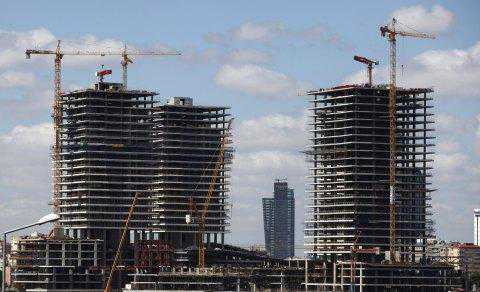
Zorlu Center, under construction – a mixed use project which will include five different functions for the first time in Turkey with the culture and art center, hotel, business center, shopping center and residences – is seen in the district of Zincirlikuyu, Istanbul, August 23, 2011.
Turkey’s economy is booming, led by construction in its largest city, Istanbul. Supported by foreign investment, city authorities are embarking on massive redevelopment. But concerns are growing that citizens’ rights have become victim to the projects.
In the Tarlabasi district in central Istanbul, houses are being destroyed as part of a major redevelopment by local authorities. Most of the thousands of people living here have been evicted, even if they own their homes like Mehmet Tas.
He says his children grew up in Tarlabasi, their friends are there and their school is there. Tas says if he moves from the area, he will lose his job because he will not be able to pay for his commute to work.
Tas, like many others in the Tarlabasi district, has been offered state accommodation 40 kilometers away. The plight of the Tarlabasi residents has become a focal point of growing concern about the redevelopment of Istanbul.
On Sunday, hundreds of people protested the redevelopment plans in Taksim square in the center of Istanbul, close to Tarlabasi.
Although occupying a prime location, Tarlabasi is one of the city’s poorest districts. Its dilapidated but cheap housing has made it the traditional home to some of the most vulnerable sections of society.
The mass evictions of its residents have drawn growing criticism. Andrew Gardener of the British-based human-rights group Amnesty International recently published a report strongly condemning the project.
“Tarlabasi is a particularly outrageous example of the way urban regeneration is being carried out, resulted in people being evicted without alternative housing, adequate housing, being provided,” said Gardener. “Frequently, [the] people most at risk, as in Tarlabasi, people from Roma families, transgender women. People who find it very difficult to get accommodation in the private sector for a number [of] reasons.”
But local Mayor Misbah Demircan strongly rejects such criticisms. He says the regeneration project is as much about helping the local residents as the city as a whole.
He says most of the 278 buildings being razed are condemned buildings. Three days ago, he says, a building was burned down because it was so old and dangerous. The buildings are fire hazards, and some even collapse in heavy rain. He says people living there live under risk of death. There is no safety of life or property. He says authorities are offering safe and new houses in exchange.
The new homes Demircan is referring to are state housing, most of which is located far away on the city outskirts. Critics claim most who accept such offers invariably lose their jobs, being unable to afford the commute to work, or are unable to afford the rent of the alternative housing.
Professor Yves Cabannes of the Development Planning Unit of University College London has been studying Istanbul’s redevelopment. He says the experience of a previous redevelopment project in the city supports such concerns.
“Three-hundred-sixty [families] were put 60 kilometers away,” said Cabannes. “Do you know how many out of the 360 are still in the blocks? Two. All the others are just roaming over the city, homeless, and our conclusion is that the renovation, which is claimed by the government, is minimum. It’s about 1 million homes, which is massive. It’s a massive project.”
Throughout Istanbul, construction projects are speeding ahead throughout the center of the city, with the building of high-quality housing aimed at middle and upper classes. Istanbul is at the center of the country’s booming economy, which has enjoyed unprecedented growth for the past decade and continues to flourish despite the world economic turmoil.
The city is in the grip of a property boom supported by investment from across the region from Russia to the oil-rich nations of the Middle East. Istanbul’s city skyline is cut by rising skyscrapers and construction cranes. But critics warn the people of Tarlabasi and many more of Istanbul’s poor are likely to pay a very high price for such redevelopment.
via Istanbul’s Unprecedented Property Boom Causes Concern About Citizens’ Rights | Middle East | English.

Leave a Reply